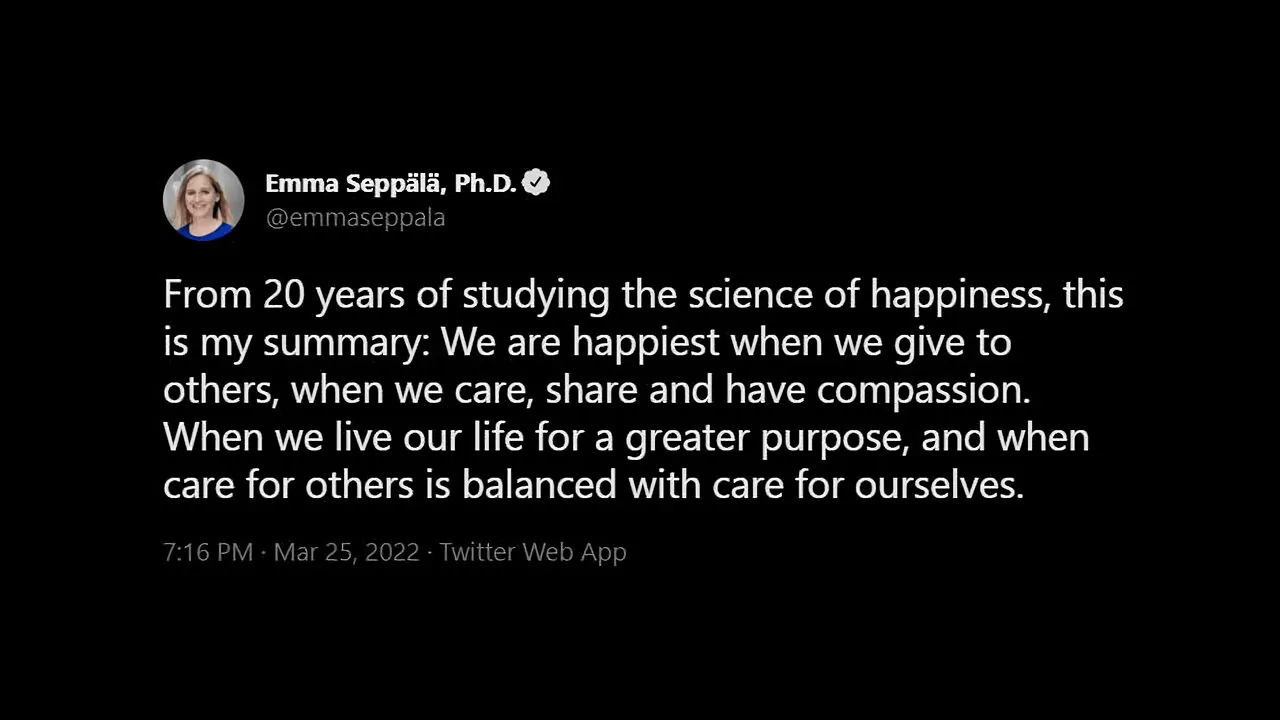Today's Monday • 6 mins read
Happiness is not the absence of sadness. Pleasure and despair are not the opposite ends on a single continuum. How sadness does not happen is distinct from how happiness happens.
“Happiness or life satisfaction is the degree to which one judges the quality of one’s life favorably.” — Veenhoven (1995)
That said, ask yourself who commands your life’s ship.
Is it you, or someone else, who stands at the helm of your life’s ship and commands it which way to go?
If your ship is mostly captained by someone else, you may be just steps away from a meltdown. Because something tells you that if you were the captain, it would be a happier ship sailing the high seas.
Science backs this up and confirms that a big portion of your happiness comes from your freedom to choose your life’s direction. This means you’re better off setting your own happiness goals.
Moreover, when you’re free to direct your own life, the journey is an exciting adventure.

How Happiness Happens: Understanding The Science Behind Happiness
Here are a few truths from The Science of Happiness:
• First, happiness doesn’t naturally happen when you get over your unhappiness. Researchers have found that low levels of neurochemical serotonin may indicate depression (though a recent study pointed out that the serotonin theory of depression has little empirical support and it is probably an “urban legend”), but high levels do not suggest happiness.
• Second, happiness does not always happen when you smile, despite the popular belief that when we smile, it makes us happier. To identify if a person is really happy, experts check the frequency of positive behaviors like smiling, laughing, and helping others. It allows them to find out which of the happy-looking faces belong to truly happy people.
• Third, many factors contribute to a person’s happiness, like genetics, environment, socioeconomic status, and mental health. There is a happiness formula too that says we inherit roughly 50% of our happiness from our parents.
A large portion of your happiness depends on your ability to choose your life’s direction.
And who found that? Schmuck found that, along with Sheldon (Life goals and well-being: Towards a positive psychology of human striving, Peter Schmuck and Kennon Sheldon, 2001).
• Fourth, happiness is subjective, meaning it’s a personal experience. So, while it is challenging to measure, measuring happiness is what positive psychologists do.
Measuring Happiness As It Happens
To measure a person’s level of happiness, positive psychologists mainly use three methods: self-reports, observer reports, and physiological markers.
1. Self-reports
Self-reports are by far the most common way for researchers to assess happiness. They rarely ask questions like “Are you happy?” Rather, they ask measurable questions.
Questions like the ones below give them a fairly accurate idea of one’s level of happiness:
- “On a scale from 1 to 10, how happy are you most of the time?”
- “Looking back at your life as a whole, overall, how happy are you on a scale of 1 to 5?”
The Oxford Happiness Inventory (Hills & Argyle, 1998) and the Satisfaction with Life Scale (Pavot & Diener, 1993) are two common happiness scales. They include 10 to 30 questions.
You can also measure your happiness level with a single-item Self-rating of Happiness Scale. That single question is:
“Do you feel happy in general?”
However, instead of saying yes or no, you have to rate yourself on an 11-point scale (0-10, where 0 is the minimum, and 10 is the maximum score).
2. Observer reports
They involve asking people who know the person well (for example, friends or relatives) to score their happiness on a scale of 1 to 10.
3. Physiological markers
It involves using devices to measure and record various aspects of a person’s body, such as heart rate, blood pressure, and salivary hormones.
What Goals Bring Happiness
Whatever direction you take, you have to have goals that promise you your best possible future self. These goals, you call them your life goals—or core goals—are like the lighthouse beacons that direct your boat.
How do you choose these core goals?
More specific: how do you choose these goals so that they give you the best shot at happiness?
- First, you’ve to know for sure what those goals are.
- Second, you’ve to know why you’re to go after them.
- Third, you’ve to make sure your goals gel with your values. By the way, values are your deeply held beliefs. Goals that don’t match your values, don’t give you as much happiness as you thought they’d do.
- Finally, your goals shouldn’t be in conflict with each other. If you want to master piano and boxing both, you’re setting up conflicting goals. You will have to give up one, as one needs finer hand movements and the other rough.
So, if your values are materialistic, such as money or looks, you get great satisfaction when you achieve wealth and beauty. But if your values are non-materialistic, such as benevolence or compassion, you won’t feel as satisfied if you buy yourself a castle or an anti-aging face surgery.
Another aspect of your happiness is to take care of your psychological needs, which are autonomy, competence, and relatedness.
According to the self-concordance model, your well-being is higher when your goals satisfy your psychological needs.
When you choose goals according to these guidelines, you ensure your future self a higher level of happiness. Moreover, such fine-tuned goals also help you push yourself to achieve them.

Best Qualities of Happiness Goals
According to Dr. Sonja Lyubomirsky, one of the first positive psychologists and author of the bestseller book The How of Happiness, the optimal goals for happiness have the following qualities:
- Realistic and attainable.
- Approach goals.*
- High in commitment.
- Personally meaningful.
- Concerned with community and growth.
- In harmony with your needs and values.
- Intrinsically motivated.
- Do not conflict with each other.
*Approach goals are those that you move forwards to rather than withdraw from. As attaining a certain healthy weight than losing a certain number of extra pounds.
Why You Fail To Pursue Your Set Goals
Why do you fail to pursue your chosen goals?
Now that you’ve selected your goals, you may find yourself in situations when you don’t follow them to the end. Researchers Ford and Nichols found that there can be three reasons for this:
- You select urgent or attractive—but unimportant—goals.
- You have a fear of failure, so you don’t even start working on them.
- Your goals turn out too hard to keep going after them.
Final Words
“Happiness is found by giving it away.”
― Max Lucado, How Happiness Happens: Finding Lasting Joy in a World of Comparison, Disappointment, and Unmet Expectations
The happiness goals you pick after deciding where you want to go in life define how happiness happens in your life. Your happiness goals enable you to focus your attention and efforts on what is useful at present for your future of happiness.
√ Also Read: Why People Do What They Do: A Classification of Human Goals
√ Please spread the word if you found this helpful.